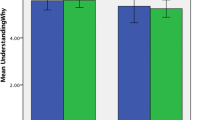Abstract
As a sociological topic, and perhaps also as a philosophical topic, knowledge has gone through a period of uncertainty if not of degradation. Among those who reflect upon such topics, the conviction has become widespread that in the last resort all human knowledge is uncertain. Many see knowledge as predetermined by certain givens of human nature, for instance by the immutable laws of human reasoning and thus flawed as a symbolic representation of a real world which exists independently of human reason.
The manuscript is archived under the number 807 from P. KII 41 onwards, Stage II: Development of a Hill-Top Tribe, in the Deutsches Literaturarchiv, Marbach am Neckar. The manuscript was dictated in 1987. Sub-headings have been added by the editors. This manuscript was mainly edited by Adrian Jitschin. -eds.
Access this chapter
Tax calculation will be finalised at checkout
Purchases are for personal use only
Similar content being viewed by others
Notes
- 1.
Hugo Huber, The Krobo: Traditional Social and Religious Life of a West African People (St Augustin: Anthropos Institute, 1973), p. 273.
- 2.
This sentence, as recorded in the dictated text, was lacking a clear subject and main verb, although the intended meaning was fairly clear.—eds.
- 3.
Huber, Krobo, p. 241: ‘A senior priest, in accordance with his status, normally has two, three or even more wives … Economically a priest is able to make a good living from the offerings of the people and particularly from the heavy fines or ransom sums in … ritual oath cases. But most priests apart from their main function do some farming near their residence.’
- 4.
As recorded by the person taking dictation, the sentence read: ‘They were exposed to its constant pressure and of prolonged failure of the gods whose confidants and representatives priests were could diminish and even seriously impair their power.’—eds.
- 5.
Huber, The Krobo, pp. 262–3.
- 6.
Cf. Elias, What is Sociology?, enlarged edn (Dublin: UCD Press, 2012 [Collected Works, vol. 5]), chapter 2, ‘The sociologist as a hunter of myths’—eds.
- 7.
In chapter 8 of Things Fall Apart (New York: Penguin Books, 1994 [1958]) Chinua Achebe describes the character Ezinma, a girl, who is believed to be an evil spirit (ọgbanje).—eds.
- 8.
Sigmund Freud, Totem and Taboo (London: Routledge & Kegan Paul, 1950)—original German, 1912–13. –eds.
- 9.
Huber, Krobo, pp. 247–8.
- 10.
Cf. Freud’s concept of the ‘reality principle’ (Realitätsprinzip), which describes the individual ability to assess reality properly, and in consequence to act in accordance with this assessment. Freud contrasts the ‘reality principle’ with the ‘pleasure principle’ (Lustprinzip).—eds.
- 11.
This sentence in the dictated text is very unclear: to what does ‘all those’ refer, and what ‘is shamed’? It occurs in a part of the typescript where there is an unusually large incidence of typing mistakes and missing words. The explanation may simply be that the assistant taking the dictation was becoming tired.—eds.
- 12.
See Norbert Elias and John L. Scotson, The Established and the Outsiders, enlarged edn (Dublin: UCD Press, 2008 [Collected Works, vol. 4]), chapter 7, ‘Observations on gossip’.—eds.
- 13.
Elias used the idea of a controlled decontrolling of emotional controls especially in his work on sports and leisure; see Norbert Elias and Eric Dunning, Quest for Excitement: Sport and Leisure in the Civilising Process, enlarged edn. (Dublin: UCD Press, 2008 [Collected Works, vol.7]), and Jan Haut et al. (eds), Excitement Processes: Norbert Elias’s Unpublished Works on Sports, Leisure, Body, Culture (Wiesbaden: Springer VS, 2018). It has also been extensively invoked by Cas Wouters in his theory of informalising processes; see Informalisation: Manners and Emotions since 1890 (London: Sage, 2007), and Cas Wouters and Michael Dunning (eds), Civilisation and Informalisation: Connecting Long-term Social and Psychic Processes (Cham, CH: Palgrave Macmillan, 2019).
- 14.
At about this point, Elias added a handwritten note on a separate sheet. It is only partly decipherable, but this indicates his general drift (eds): ‘The term “repression” has now become widely used with strong negative undertones. As Freud introduced it, from the start it was linked to his imaginative reconstruction of the primordial horde [in which] the father had no need to repress any impulses at all. That appeared as the ideal condition of humanity. Adam’s sin, the fall of man in the Freudian version, was the killing of the primordial father by his sons, the common guilt feeling—why actually should they feel guilty?…’.
- 15.
Huber, Krobo, p. 267.
- 16.
Ibid.
- 17.
The phrase ‘broken a proscribed code of conduct’ is as recorded from Elias’s dictation but, even if its sense is clear, is obviously nonsensical English. No doubt Elias would have corrected it if he had re-read it closely. It could be amended to read something like ‘broken a prescribed code of conduct’ or even ‘committed a proscribed action’, but we decided to let it stand as dictated.—eds.
- 18.
Huber, Krobo, p. 268.
Author information
Authors and Affiliations
Editor information
Editors and Affiliations
Rights and permissions
Copyright information
© 2022 The Author(s), under exclusive license to Springer Fachmedien Wiesbaden GmbH, part of Springer Nature
About this chapter
Cite this chapter
Elias, N. (2022). Priests and Knowledge. In: Reicher, D., Jitschin, A., Post, A., Alikhani, B. (eds) Norbert Elias’s African Processes of Civilisation. Springer VS, Wiesbaden. https://doi.org/10.1007/978-3-658-37849-3_8
Download citation
DOI: https://doi.org/10.1007/978-3-658-37849-3_8
Published:
Publisher Name: Springer VS, Wiesbaden
Print ISBN: 978-3-658-37848-6
Online ISBN: 978-3-658-37849-3
eBook Packages: Social SciencesSocial Sciences (R0)




